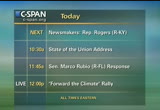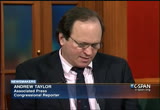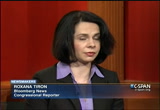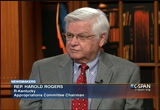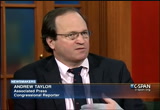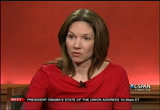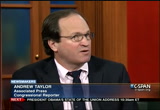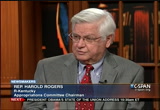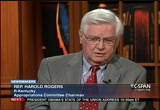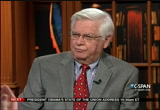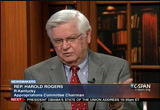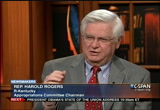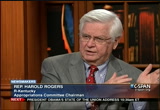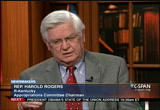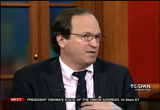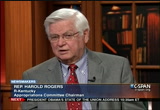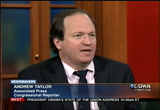tv Newsmakers CSPAN February 17, 2013 10:00am-10:30am EST
10:00 am
10:01 am
>> this week on news makers, we are joined by hal rogers, chairman of the appropriations committee. thank you for doing this. to reporters to help us with this conversation, and the tailor the associated press, congressional reporter, and roxanne from bloomberg news, congressional reporter. >> mr. chairman, as everybody in washington is very concerned about this phenomenon called a sequester, these automatic bid into automatic indiscriminate cuts across the board, 8% to the pentagon, you have been looking at the kind of impact this will have. what you expect? how much damage you think it would do four different
10:02 am
operations? >> needless to say, being an appropriate, but think it is an idiotic way to do business. these are indiscriminate cuts. they are not thought through. they're just automatic across- the-board, without any consideration of good, bad or evil or whatever. so i think the cuts are devastating. i am sad to see take place. but i don't see any effort being made realistically to stop it. >> do you think that, once the sequestered takes effect, that people will see the wide ranging implications and that there will actually start working together to figure out how to replace it or a verdict? >> that is my hope.
10:03 am
number one, most of in the week to avoid it. i think it will have a shocking effect on so many agencies of the government that, hopefully -- >> what do you think it will take for people to say, finally, let's get together and figure out a way to not let this happen. >> because to the military are the most severe. that will require the layoffs of thousands of employees could not to mention military operations and maintenance. but also these cuts will affect every agency, every operation of the government, except social
10:04 am
security, medicare, medicaid, and food stamps. those are exempt. but every other agency of the -- other agency or program will receive a cut, probably 5% around it. but since we're willing to the fiscal year, the balance of the year, these few months, you will see these cuts have a greater impact than 5% for the year. >> the way this thing is designed, he does oppose you can believe identity program levels. not every account or agency is important. if i was the culture secretary, i might be more concerned about need inspections. but they don't have the flexibility to do anything about this. do you want to try to give them
10:05 am
some flexibility? do you think they want that kind of flexibility? >> they want some help any with the can get it. but the president does have some flexibility in how the cuts are administered. i am trying to -- of 34 the administration to request reprogramming. that would be of some help, but not a major piece. >> you're talking about the legislation that keeps the government funded. >> correct. it is unfortunate that all of this is hitting it the same time
10:06 am
because it is doubly confusing. >> yes. >> the sequester was never intended to take effect. it was intended to get the warring tribes to agree on a budget. but now some of your party so ardent conservatives are embracing it as a way to maybe get more leverage on the budget. but the defense cuts are concentrating a lot on areas where pete -- where republicans can perform well. the effect on civilian employees will be quite dramatic. do you think some of the tea party members who are currently increasing this question will be hearing from the constituents, particularly those from the military, and come to regret it? >> there's no question, the
10:07 am
reaction when the sequestered it come it will hit all of us, every congressional district in the country. i keep hoping that the president will come forward with a realistic plan to avert a sequester. we have seen nothing of the sort. he is the only person that really has the capability to make things happen so that we avoid this question. but i have seen nothing out of the white house that is realistic in that regard. >> what would you consider a realistic plan? what would be unacceptable, realistic plan that the president could present to congress, to both chambers? >> all of this activity is about an effort to rein in spending. we are borrowing 42 cents of
10:08 am
every dollar we spend the deficits are a loss of control. we have a debt of nearly $16 trillion. what we're looking for is realistic ways to cut spending. as has been said before, we'll inappropriate in little over a third in federal spending. that is what congress annually per prius or is supposed to. -- annually appropriates or is supposed to. two-thirds is forever veterans pensions and medicare medicaid and others. that is world the money is. until you're in in the entitlement spending, we can i get to a balanced budget, which is our goal. -- cannot get to a balanced budget, which is terrible. spending is increasing dramatically. when we first came to congress,
10:09 am
we appropriated two-thirds of spending. now it is the third. antoniewicz took up one-third of spending and now it is two- thirds. -- entitlements took up one- third of spending and now it is two-thirds. we have made -- the white house has made no effort to help us rein in the entitlement spending. >> if the white house does but something for an entitlement spending, will republicans, yourself, would you agree to corporate loopholes, as the president said in the state of the union? >> i think the loopholes and to be looked at. the ways and means committee is working now on a tax reform package, which includes loophole
10:10 am
closures. that will take time. that is something that we don't have at the moment, time. the entitlements spending is where the action needs to take place. if we eliminated every penny we appropriate for every agency, including the military, if we did away with all discretionary spending, we would still be in the red. and ... it's a good to get those kinds of savings are in -- and the only place to get those kinds of savings are entitlements. all of the parties, by and large, have laid out over the last few years the things that could be changed and modified to save those programs for the future by some reforms could -- reforms. so there are plenty of reforms laying around the new one has picked up and put together.
10:11 am
and they can only happen, i think, when the president, the head of the government, puts together a package. and he is not doing that. >> list of about something you do have some control over, the unfinished appropriations bill for 2012. the senate had a higher cap. that is important, i think because it makes it difficult to set expectations and said the various subcommittees. now it is commonly expected that a lot of those appropriations bills, much of which have been completed and are ready to go, will just be thrown away and the government will operate on autopilot. can you talk about why this process broke down? do you plan to take a couple of
10:12 am
bills, particularly for the pentagon or the veterans and attrition and try to end least move them in concert with this continuing resolution? >> the house, my committee, approved all 12 bills. we sent seven of them to the floor of the house, which passed. in the meantime, the president and the senate did nothing. because of lack of floor time on the house side, the issue said that the senate will not act on any bills. what we waste time putting them on the floor in the house? we went into the cr, a continuing resolution. this is a badly to do business. -- this is a bad way to do business. we had seven bills that passed
10:13 am
the house and they were ready for action in the senate. but they did nothing. we have to have a budget resolution of the house side that agrees with the senate budget resolution so that we're working with the sin number. when we're working with different numbers, it is obvious that it won't happen. i think the secret here, the solution, would be to have a consistent budget resolution, both house and senate. that gets us into the big questions, the big debate about spending and entitlement cuts and taxes and so on. i am hoping that we can get back to regular order. that has been my job since have had it, giving individual rules -- individual bills under open rules and some to the senate and they do the same. and we have a conference with the senate to work it out. that is the way this process is
10:14 am
supposed to operate. i have been trying to get to that point. the to have to have two parties to tango. the house has tang good and the senate is asleep. and theouse has tang gtangoed senate is asleep. i would like to take the appropriations for the defense department and military and construction and take what we have passed through the house and senate and conference and insert them into the sea are, which would give the pentagon , which wouldthe sea arcr give the pentagon some time. we're spending so much time on last year's appropriation. they can do new starts. they can take money away from programs that are no longer needed. they cannot do anything of that
10:15 am
sort. so we are wasting so much money. but to mention damaging maintenance and operations in the military. so want to give them some flexibility. they desperately needed. national security demands it. i'm hopeful we can do that. >> would be doing to present this plan to your colleagues? particularly the ones who want to see very deep spending cuts or let the sequestered to effect? how the present this plan to both your republican conference and also to the leadership, which has promised that the retreat that the spending for the rest of the year would be much lower levels, under $1 trillion, no matter what. how do you much everything that? how do you make sure that the conference is on board, that the leadership was on board, with
10:16 am
what your turn to do? >> that is what i am attempting to do, bring us all together around a common plan. there are lots of meetings with membership and leadership and their seven partners and the like. doing the defense bill as a part of the cr is receiving general acceptance. i received a lot of contacts from regular members to do this. i am hopeful that our colleagues in the senate will agree. they seem open to that. >> has your the issue presented it to the senate democratic leaders? >> i don't know. i have met with chairwoman
10:17 am
mikulski and dick shelby, the ranking republican over there. as well as on that side, the ranking democrat on our side. we talked about this and i think there is an openness to this idea. we will see. but there are so many unrelated or semi-related things. we have sequestration, continuing need to keep the government going -- both of which are happening simultaneously -- so there are lots of pressures and costs currents letter taking place -- and crosscurrents that are taking place. i would like african keep continuing resolution summit segregated from the the really tough questions -- i would like it if we can keep continuing
10:18 am
resolution somewhat separated from the really tough questions. >> on the sequestration question, if the american people start to see the effects of sequestration, they say fix it, can you go back maybe through the continuing resolution and retroactively and do the sequestration? >> it is a separate question and it has so many different aspects that don't relate to each other. sure, that is possible. i don't think it is realistic because we have not seen the white house to engage with us in conversations about cutting spending, which would give us some leeway on and really -- on relieving sequestration. the goal all of this, from our point of view, is how we cut spending, which the lighthouse -- which the white house has
10:19 am
been unwilling. if the white house gets the message from the public that they need to fix this, hopefully, they will see fit to reform entitlements spending which would give us the open ness to talk about sequestration in the cr. >> is there any way that you can work with your counterparts? is there any way to work this out from the congressional level rather than wait for the present to bring a plan? >> i don't see a solution on the horizon in the congress. this is such a huge effort that it would take to relieve sequestered that only the head of the executive branch with all of the agency heads under their
10:20 am
tow, they are the only ones who can come up with a comprehensive plan. that cannot be done in congress. because the congress, as you know, is divided. republican house, democratic senate. they don't agree on spending oran cuts. they don't agree on anything. it's left to the president to try to put a package either to relieve us of sequester. >> but the public agrees on most things with the president. how can the president present an inclusive package? >> we need to have a conversation. so far, we have been talking to ourselves. the president has been part of
10:21 am
the conversation and being realistic about what is achievable in the congress in order to relieve the country of this awful sequestration, this automatically slicing of spending from taking effect. >> there is a phenomenon that surrounded the appropriations process for years and years and a vision that a bad rap called your marking -- called earmarking. someone like yourself would want a new community center or street lights are roads or lock and dam or something like that, and it ultimately ballooned to a process that was much criticized. speaker boehner was the muscle who got them ultimately banned because there were a lot of them and, a future report to the bills looking for them, -- and
10:22 am
if you cherry picked through the bills looking for them, they were ultimately banned. what has that done on the process? as a major job more difficult because now you have members who don't want to go along and have little incentive to go along because they don't get results for their constituents? >> it has made it more difficult. i personally think that a member of congress not only has the opportunity, but the obligation to represent his communities and his counties and this state in the u.s. congress. i think they should be and is a part of our responsibility. being allowed -- to allow representative to pursue a request from the city or county or the state or political substitution, a government unit,
10:23 am
i think we should be allowed to advocate for our home towns. however, the conference has seen fit to impose a ban on so-called earmarkes. i have to abide by that position the caucus has taken. >> de think there are a lot of members who would like to have them returned? do they tell you that privately? >> is, does a better every day. a member or two or three -- yes, just about every day. a member or two or three will come to me. if we limited them to read -- 2 official request from a local city or mayor or city council or state government or government unit officially, i think if we
10:24 am
allow that type of advocation by members of congress, we would not have that things happen. we had some bad things happen. the so-called bridge to nowhere. by the way, which was not an appropriation. it was the authorization committee that did that. but we could enforce a very limited number of those, i think, if we had permission from the caucus and from the rules of the house and senate. >> we have a couple minutes left. >> do you think that took away the incentive of both members to dissipate in an actual debate? you think it's his turn everything into an ideological debate where people cannot come together because there is no incentive for them to work on certain bills or on certain processes? >> yes, i think it has hurt the process.
10:25 am
>> you said you met with senator mikulski. she is brand new pair of shoes the first woman to ever chair the appropriations committee in either house or senate. she has a bit of a different operating style, i think. can you talk a little bit about her? >> yes, i merely pleased with her. i met her in the house when she was in the house and we work together somewhat back and as well. i like her style. i like her energy. and i think she is determined, and as i am, to get us back to regular order. she and i talked about that today. i think we will see a different senate operation now. hopefully. i think she is capable of doing that and i think she is headed in that direction. and, by the way, nita loy, she
10:26 am
is the first appropriations director of the house side. >> de you think -- >> i think paul ryan, the chairman of the house committee, has been in contact with senator murray. i think they're both very practical-minded people and understand that this is a practical place where we are talking about here. i hope and trust that the budget committees will agree on a single number so that we can do our job, which cannot do otherwise. >> are closely do you work with paul ryan? >> very well. he is a bright guy. he understands what our predicament is on appropriations, that we are limited on what we can do, on the big number that he gives us and the budget resolution is. he understands that and he sympathizes with their
10:27 am
predicament. i told him and i have told others. you guys are up in the pilot house steering the ship of state with your lofty ideas. the appropriations committee, on the other hand, is in the engine room banging on pipes and shoveling coal. we are the practical people. we have to make it work. when i have to hands shoveling coal down there, the senate in the house, we can make things happen. but if we are not in sync, the ship of state is dead in the water and that is where we or -- where we are right now. >> thank you for being part of "newsmakers." >> good to be with you. >> we're back with our reporters to help us talk about what we just heard there from the chairman of the appropriations committee and talking about the difference between appropriators and the budget committee and the members who sit on that. what has happened -- why are we
10:28 am
talking about sequestration? he talked a lot about regular order. where we not in regular order? >> the sequester was a mechanism designed, back when we had the the limit crisis of 2011, and it was put in place at the suggestion of the white house as a way to guarantee the spending cuts demanded by speaker boehner. then we had this phenomenon known as the super committee in the fall of 2011. that included on taxes. -- that is imploded on taxes. now with president obama's win on taxes around the fiscal with the're left sequestered. there are some hard feelings on what happened on the tax bill. there are ardent conservatives, the peak -- the tea party people
10:29 am
around here who see that as a way to lock in budget cuts and nobody seems to be able to avoid it. and quite frankly, it seems like there has been a recognition that the only way to stop the sequester is to let it happen and let us feel the effects. what we heard from chairman joe -- chairman rogers is a description of the problem that he does not have the solution and nobody appeared as. >> so sequestration happens. are you saying they go back and fix it? through what mechanism? >> that is unclear. >> @ think everybody is hoping -- overall, lawmakers like hal rogers are hoping that this is my take away, that once it happens, they cannot stop until march 1. i don't think they see any way to do it until then. but he hopes that people will but he hopes that people will see the effects of
77 Views
IN COLLECTIONS
CSPAN Television Archive
Television Archive  Television Archive News Search Service
Television Archive News Search Service 
Uploaded by TV Archive on

 Live Music Archive
Live Music Archive Librivox Free Audio
Librivox Free Audio Metropolitan Museum
Metropolitan Museum Cleveland Museum of Art
Cleveland Museum of Art Internet Arcade
Internet Arcade Console Living Room
Console Living Room Books to Borrow
Books to Borrow Open Library
Open Library TV News
TV News Understanding 9/11
Understanding 9/11
